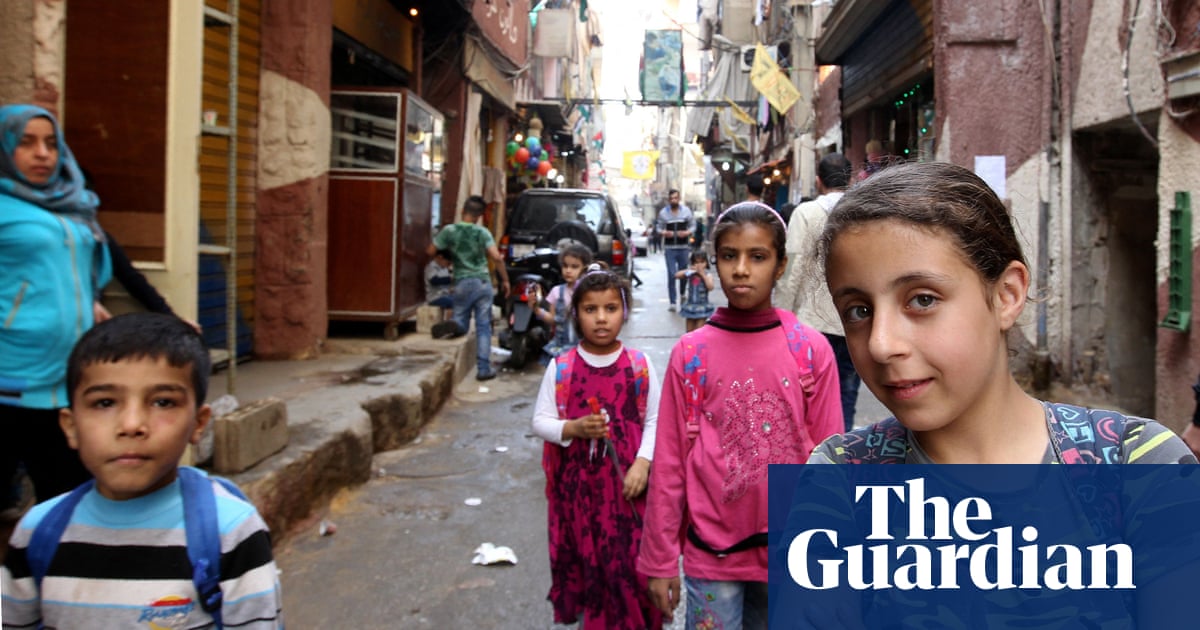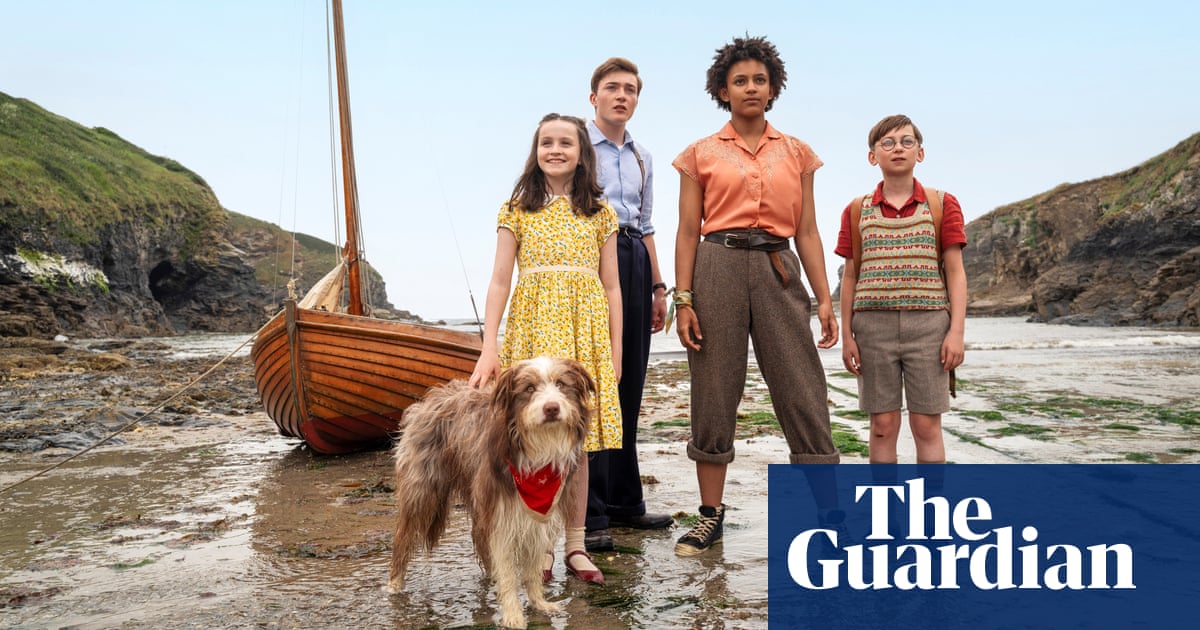
Anyone who has grown up reading The Famous Five will know that Timmy – the dog among the gang of adventuring children in Enid Blyton’s books – is vital to their crime-solving capers. Tamara Harvey, directing a musical adaptation that opens this month, says the canine casting was a source of no small debate. “There were those who thought he should definitely be a [real] dog.”
But given the vagaries of animal behaviour on stage, Theatr Clywd and Chichester Festival theatre’s co-production settled on a puppet instead. It is a magnificent creation; Timmy is out in full force for rehearsals at the London Welsh Centre, along with his puppeteer, Elisa De Grey. He bounds up to strangers, barks and wags his tail, so fluid in his movements that it is impossible not to be won over.
Harvey had the idea to adapt the beloved books into a musical around 12 years ago but things only came together in 2018, and then were delayed by pandemic closures. When the world opened up again, her team went to Dorset – where the stories are set – to get a sense of the landscape.
Writer Elinor Cook kept her book for the musical faithful to the spirit of the original although she did not dramatise a single story from the series of over 20 books. “There’s something really appealing in the fact that they exist as a host of books rather than one story that everyone recognises. I wanted this to be a sense of their world with all the touchstones – children being feral and saving the day, picnics, loyalty, kindness and community, with adults being peripheral,” she says.
The drama opens as the siblings Julian, Dick and Anne arrive at Kirrin Cottage and meet their cousin, George, for the first time. The publisher, Hachette, which holds the rights for Blyton’s books, was actively involved in the development process, Cook explains. “They are laser-guidedly clear on what it is that they believe the Famous Five to be. Happily that chimed with all of our thinking [so] there weren’t any clashes of intention.”
But the setting itself is unpinned from Blyton’s postwar Britain and now in an unspecified time period that Harvey describes as a timeless present. “Our touch-point was the Paddington films in the way they are in the kind of ‘now’ that doesn’t exist. So a ‘now’ of our imaginations – the childhood holidays that everyone wishes they had where no one mentions mobile phones and where the days go on forever and the beach is always sunny. Even the original books are set in a world that never really existed: somehow, every summer, no one gets any older. It’s a world of infinite possibility where boundaries of time and space don’t exist.”
Cook did find ways to update it in terms of its central storyline, which talks directly to the issues of the day. Nature is under immediate threat in the children’s world and environmental issues are of grave importance. As, almost, in the original, George’s father, Quentin Kirrin, is a climate scientist while his nemesis Rowena (who ardent fans might recognise as a gender-reversed twist on Mr Roland) is a fellow climate specialist. “Quentin’s a specialist in alternative energies [in the original]. When I re-read the books, I couldn’t believe it – it felt so contemporary, so necessary to have that as a part of our show.”
It was a case of delicately weaving this potent issue in with the fun, freedom and exhilarating adventures the children experience without making them, or young audiences, feel burdened, adds Harvey. “Knowing what children have been through in the pandemic, and wanting to give them something that was full of hope, kindness and fearlessness, and also to make them laugh, we didn’t want this to be another moment where they feel buried by what is happening. We want them to feel they are truly escaping, that there is a way forward and through this extraordinary time.”
The production seeks to practise environmental responsibility too, so much of the set is made from recycled or reclaimed sources, explains designer Lucy Osborne. “It is made from a combination of reclaimed wood and timber, along with things found on the beach in Chichester.” A map across the stage has model boats made from cork and timber, tents from old shirts and Kirrin Cottage fashioned out of an old picnic hamper.
Another modern resonance comes through the character of George and her exploration of gender. Having been christened Georgina, the 12-year-old goes by the name of George – which her father initially refuses to acknowledge. In one powerful moment of Cook’s script she says that whenever someone calls her Georgina it feels like she is standing beside herself. Could her character identify as male in contemporary terms?
“It’s a journey that George isn’t fully at the end of,” says Cook. “George knows that she doesn’t feel comfortable with the trappings of femininity … and the place she feels most comfortable in is nature, with Timmy and the wild because that’s where the world isn’t asking her to define herself. I think her mum, Aunt Fanny, is able to see where this particular journey of discovery is heading and is gently trying to prepare Quentin, perhaps for a moment where his beloved Georgina turns around and says ‘I am George and I am a boy’. It feels like she is very much in the middle of that question.”
The endeavour is to hold the various possibilities in the air, adds Harvey. “There’s a moment after the show ends where she might turn around and say ‘I’m a boy’. I think there’s a moment when she might say ‘I’m non-binary.’ And a moment when she turns around and says ‘I’m a woman and I refuse to be defined by society, you sexist bunch …’ We want to leave all those doors open for her and the audience at the moment where we encounter her.”
Aside from reworking the story, there were the challenges of turning it into a musical extravaganza. While many in the production grew up reading the stories, Theo Jamieson, its composer and lyricist, had no childhood experience of this particular Blyton series so came to it with fresh eyes. “What musicals do is get you very close to characters just by having music surge around them, and these characters want huge things, as well as having massive insecurities,” he says. Jamieson gives it a hybrid soundtrack with a “collision” of classical and pop music and there are some soaring songs which uplift and move.
What about the more problematic issues around Blyton’s legacy? There have been charges of xenophobia and sexism angled at Blyton’s oeuvre over the years which Harvey acknowledges and says she has worked hard to navigate responsibly. “There isn’t anything specific in the Famous Five but it’s something we’ve talked about a lot. Hachette is very much part of those conversations. Their policy is that they remove, change and re-edit the stories and books on an almost continual basis. We’ve had a lot of discussions within the creative team … We were talking today about the ending because our ‘baddie’ [Rowena] is a woman, and is played by Kibong [Tanji], who is a Black woman. We’re re-writing as we go along to make sure that we are reinventing these stories for now in the most responsible way possible. They are still important stories to be told with themes of climate emergency, teen experience, friendship, father-daughter relationships ...”
As a family show, it aims to strike a balance between pleasing the adults, including those who have grown up holding the series dear, and introducing the gang of five to a new generation. “It should absolutely be appealing to children but my hope would be that you could come as an adult without a child and have a brilliant time too,” says Harvey.
The children themselves are performed by adults although two actors – Maria Goodman, who plays George, and Isabelle Methven, playing Anne – are only 18 and received their A-level results over the rehearsals period. There is puppetry alongside Timmy too, with various creatures making an appearance. All of it, says Harvey, is geared to create the freedom that comes with childhood “roaming” which has, in the real world, dramatically shrunk for children playing outdoors since Blyton’s time.
“There’s an important conversation to be had about how we let children have their independence and the chance of adventure [while keeping them safe],” says Harvey. “I’m acutely aware of that myself because I’ve got two small children. It’s a constant balancing act as a parent – how brave are you about saying ‘Yeah, go off to run and play in that forest’, and saying ‘No, stay close.’” But, she adds, the message infused in everything from the story to the music in this show is that children feel the freedom to roam and leave the adults behind.
At Theatr Clwyd, 23 September-15 October, and at Chichester Festival theatre, 21 October-12 November












